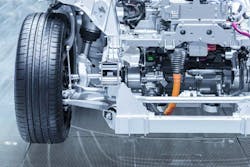Full Charge Ahead: Trends Driving EV & Battery Makers to Embrace the Digital Thread
Electric vehicles will make up about half of new car sales worldwide by 2035 as the global push for net-zero carbon emissions accelerates, according to research from Goldman Sachs. But the road to an electrified future is not without its twists and turns.
The challenge for electric vehicle (EV) and battery makers is to not only accelerate production at a sufficient rate to meet this demand in the short term, but also future proof their production operations for future inevitable innovations and disruptions.
For this to happen, EV and battery manufacturers need to harness the power of digital technologies across every facet of their business, spanning product development, manufacturing, operations, supply chain management and service. This forms a connected enterprise that unites and integrates information technology (IT) and operational technology (OT), resulting in a digital thread of information that spans the entire value chain. But what exactly is a digital thread, and how is it reshaping the landscape of electric vehicle production?
Digital Thread 101
The digital thread is a seamless flow of data that connects processes, systems, products and equipment across the value chain. Imagine it as a virtual string that weaves through every aspect of a product's lifecycle. It starts from the initial design and continues through manufacturing, testing, deployment and even maintenance. This thread connects all the dots, ensuring that information flows smoothly between different stages and stakeholders.
One of the key functions of the digital thread is the ability to connect processes and systems. In the past, IT and OT departments worked in isolation, using their own sets of data and tools. This siloed approach could lead to inefficiencies, errors and miscommunication. The digital thread breaks down these barriers by allowing data to flow freely between departments and systems. Feedback loops of data coupled with artificial intelligence (AI) and machine learning allow companies to blaze a path toward truly autonomous manufacturing, addressing workforce challenges and maximizing their competitive advantage.
READ MORE: How AI and ML are Revolutionizing Electronics Manufacturing
So, why does the digital thread matter? In a word: efficiency. By maintaining a seamless flow of data across all aspects of a business, it eliminates bottlenecks, reduces errors and saves time and money.
Trends Driving EV & Battery Makers to Embrace the Digital Thread
There are several marke trends which are helping drive EV and battery manufacturers toward the use of digital solutions.
Changing Economic Conditions
In the wake of changing economic conditions, EV manufacturers are grappling with heightened scrutiny from investors. With global interest rates on the rise and capital becoming more costly, the honeymoon phase enjoyed by early success stories like Tesla has subsided.
Investors are now less forgiving of delays and cost overruns. Moreover, the EV market has become increasingly crowded, pitting newcomers against established internal combustion OEMs with decades of manufacturing experience in their arsenal.
The digital thread offers a lifeline in this competitive landscape. By implementing an end-to-end digital thread, they can streamline their operations, reduce production delays and provide a more transparent view of their processes and timelines to investors. This not only instills confidence in stakeholders but also helps EV makers stay competitive in a crowded market.
Demand for Increased Battery Capacity
EVs are becoming mainstream, and customers are starting to demand more from their electric vehicles, particularly in terms of increased range. To meet this growing demand for increased range, battery manufacturers are forced to push the limits of battery capacity. This means developing batteries that can store more energy without significantly increasing the size or weight of the battery pack. Increasing capacity typically involves tweaking the chemistry, modifying cell designs, or exploring entirely new materials.
These changes require frequent product design refreshes, which, in turn, introduce a level of complexity and uncertainty into the manufacturing process, as each design iteration can disrupt established manufacturing processes and lead to potential inefficiencies or downtime. To address this challenge, battery makers are turning to predictive modeling.
Predictive modeling enables engineers to simulate various scenarios and evaluate the performance of potential battery designs virtually. By creating digital prototypes and running simulations, engineers can predict how changes in design parameters will affect battery capacity, efficiency and overall performance.
This data-driven approach accelerates the design iteration process, allowing manufacturers to fine-tune their products more quickly and reducing the time and resources required for physical prototypes and testing.
Rise of Solid-State Batteries
Solid-state batteries hold immense potential for the EV industry. They offer the promise to double energy densities compared to traditional lithium-ion batteries. This means EVs can store more energy in less space and with less mass, a breakthrough that has the potential to significantly extend the driving range of electric vehicles.
However, introducing new product designs, processes and materials into manufacturing facilities poses inherent risks of cost and timeline overruns.
Solid-state battery technology demands rigorous testing and simulation before physical prototypes are created. The digital thread allows manufacturers to simulate the performance of these batteries in various conditions and scenarios.
By identifying potential problems early in the development stage, EV makers can avoid costly iterations and design flaws that could delay production.
Charging Forward with the Digital Thread
In a world defined by constant change and innovation, digital enablement is not just an advantage; it's a necessity. The digital thread enables EV and battery manufacturers to not only weather the challenges of changing economic conditions, increased demand for battery capacity and the adoption of technologies like solid-state batteries, but to thrive in spite of them.
Manufacturers that embrace the digital thread are well positioned to succeed in the increasingly competitive global marketplace.
This article was written and contributed by Jamie Nelson, Industry Sales Director for Auto/EV/Aerospace at Rockwell Automation.
About the Author
Jamie Nelson
Industry Sales Director for Auto/EV/Aerospace, Rockwell Automation
Jamie Nelson is the Industry Sales Director for Auto/EV/Aerospace at Rockwell Automation.



